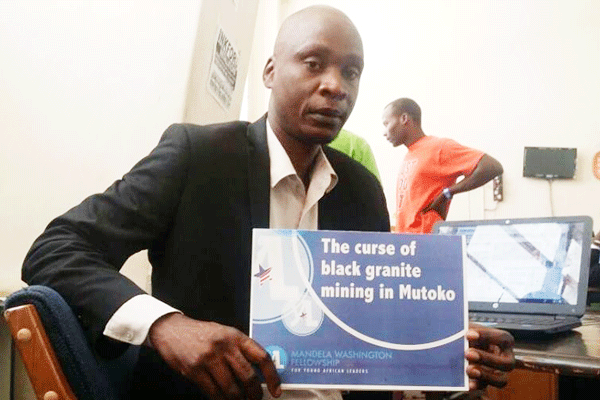
Granite mining has turned out to be more of a curse than a blessing for people in Mutoko in Mashonaland East province. It has brought about untold environmental degradation and social ills to the villagers who now find no benefit from the blasting of their mountains.
BY TAWANDA TADERERA

In a bid to unravel the truth about what is transpiring in that area, a filmmaker Terry Mutsvanga produced a documentary titled The curse of black granite in Mutoko.
It is a documentary that exposes the negative impact of mining in Zimbabwe, with special emphasis on Mutoko.
“The purpose of this documentary was to expose how communities are not benefitting from their mineral resources as well as highlighting the rampant environmental degradation taking place,” he said.
Speaking to the Standard style, he said granite mining in the area had been going on for many years and yet no meaningful employment had been created for the villagers.
“In Zimbabwe, we have a government that is failing its own people as it is failing to develop communities rich in mineral wealth,” Mutsvanga said.
The law requires mining companies to help local communities develop, but the aid has not been forthcoming.
- Chamisa under fire over US$120K donation
- Mavhunga puts DeMbare into Chibuku quarterfinals
- Pension funds bet on Cabora Bassa oilfields
- Councils defy govt fire tender directive
Keep Reading
Mutsvanga — a freelance journalist — said he was motivated by the need to highlight pro-poor issues as he bemoaned how villagers were sidelined.
“While we are busy with succession issues etc, some people in remote areas are suffering. We have Tajamukas here because of economic issues but nobody stands up for the poor villagers,” he said.
The documentary also highlights poverty and hunger issues raised by the villagers and Mutsvanga said he hoped some stakeholders will assist in providing food aid and other necessities.
In the 14-minute documentary, one of the villagers says that it does not make sense that the mining companies keep on extracting minerals while the villagers are wallowing in poverty.
The documentary was, however, barred by the Zimbabwe Republic Police from being screened and launched last week at the Harare Press Club.
Mutsvanga said he also had challenges in producing his documentary since some community members viewed his project as political and were reluctant to talk.
“I had to seek clearance from the chief and he appeared in the film. I pay for my own projects then seek partners to endorse them once complete,” said the founder of the Giraffe Heroes Zimbabwe project.
In the documentary, chief Mutoko says he is not happy because his people are not benefitting from granite mining and he wishes mining companies could do something for his people.
“We had plenty of trees that were useful for a balanced environment, but now most of them have been cut down, resulting in poor rainfall patterns.
“These trees provide us with firewood, but the problem is that mining companies are causing land degradation,” a villager lamented.
Mutsvanga was honoured twice by the Zimbabwe Human Rights Association for his outstanding work after producing two documentary films, namely Dhamu: Voices from a Tent, which exposes how the Zimbabwean government forcibly evicts citizens for personal gain, as well as Nyota: Thirst Throats in the City, which highlights the reasons behind the perennial water challenges facing Harare.











